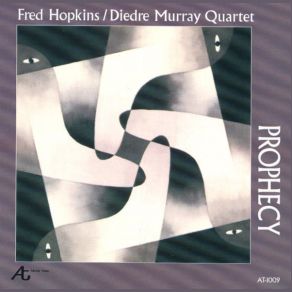Prophecy
Download links and information about Prophecy by Fred Hopkins, Diedre Murray. This album was released in 1990 and it belongs to Jazz, Avant Garde Jazz genres. It contains 6 tracks with total duration of 49:42 minutes.

|
|
|---|---|
| Artist: | Fred Hopkins, Diedre Murray |
| Release date: | 1990 |
| Genre: | Jazz, Avant Garde Jazz |
| Tracks: | 6 |
| Duration: | 49:42 |
| Buy it NOW at: | |
| Buy on iTunes $11.99 | |
Tracks
[Edit]| No. | Title | Length |
|---|---|---|
| 1. | Eureka | 8:27 |
| 2. | Prophecy | 7:42 |
| 3. | Waterfall | 11:01 |
| 4. | Doo-Wop II | 8:30 |
| 5. | Song for the Lost People | 5:55 |
| 6. | Calypso | 8:07 |
Details
[Edit]This is one of the few dates led by the late Air/Henry Threadgill bassist Fred Hopkins, who was a founding member of the AACM in Chicago. With cellist Diedre Murray, guitarist Brandon Ross (Cassandra Wilson), and Newman Baker on drums, this set of Murray compositions is a knotty, steamy, smoky ride through the various entanglements associated with a jazz ensemble whose principals are all string players. For starters, there's the spattered, elongated melodic patter in "Eureka," with its shape-shifting time signatures and tonal incongruities that have Hopkins creating a contrapuntal melody from a rock rhythm figure while Murray stops and starts, sputters, falters, and then careens in a different lyric idea against the grain of the rhythm section. Perhaps the most beautiful composition on the disc is "Doo-Wop II," a medium-tempo snaky river with eerie changes and a guitar break by Ross that reveals the depth of his melodicism. Elsewhere, on "Song for the Lost People" Hopkins gets a chance to slip into his soul groove roots for a while, carrying a Memphis harmonic figure through the middle of a minor-key shuffle that opens up in the middle to reveal a complex, sophisticated sense of syncopation and chromatic elegance. The compositions here may be by Murray, and her cello is everywhere, but the depth of feeling and closeness of the ensemble are evidenced here by the gigantic presence of Hopkins, a musician who believed that what made music go from one person to the next was the simple transference of emotion. This is a most welcome reissue.